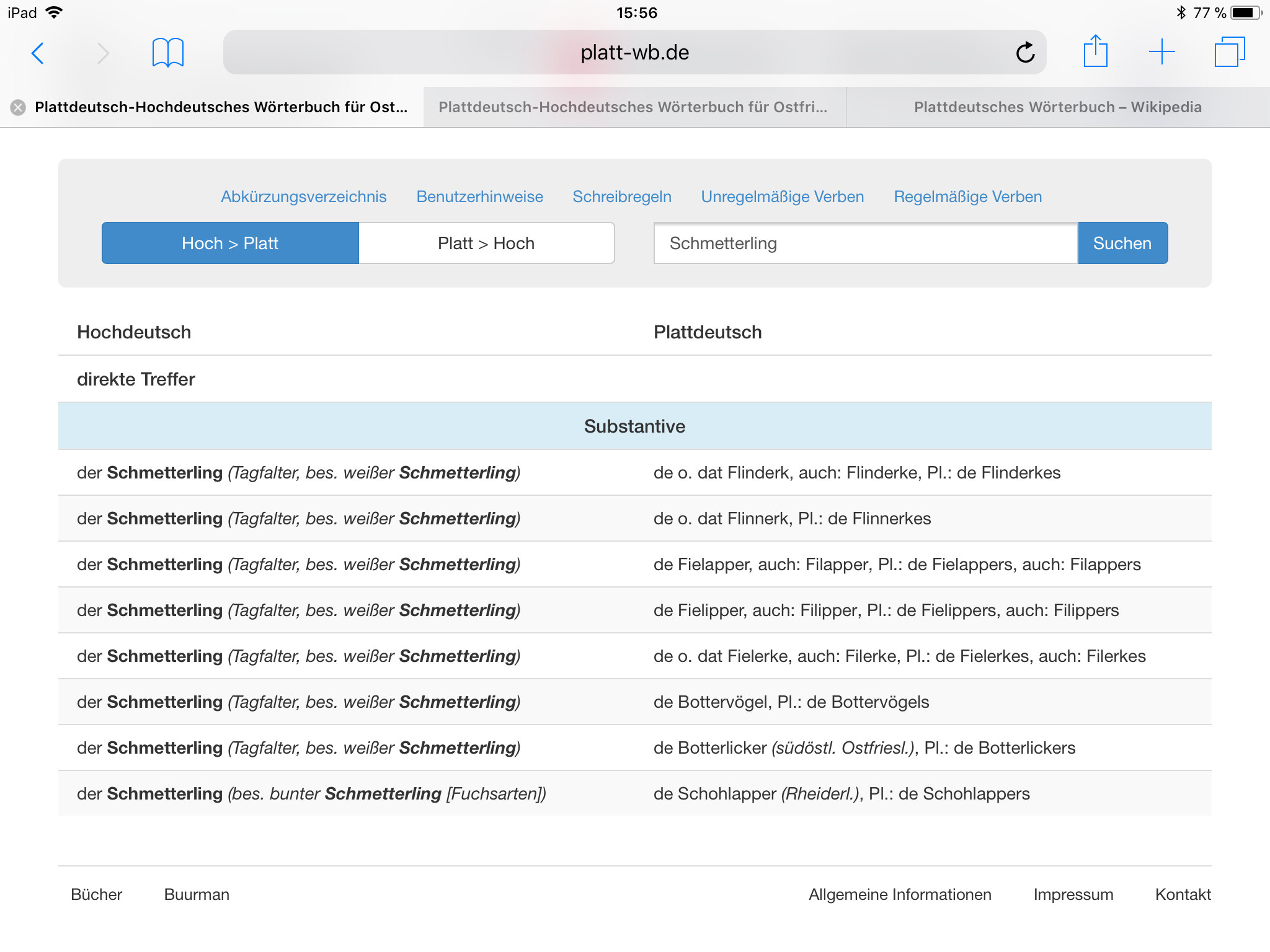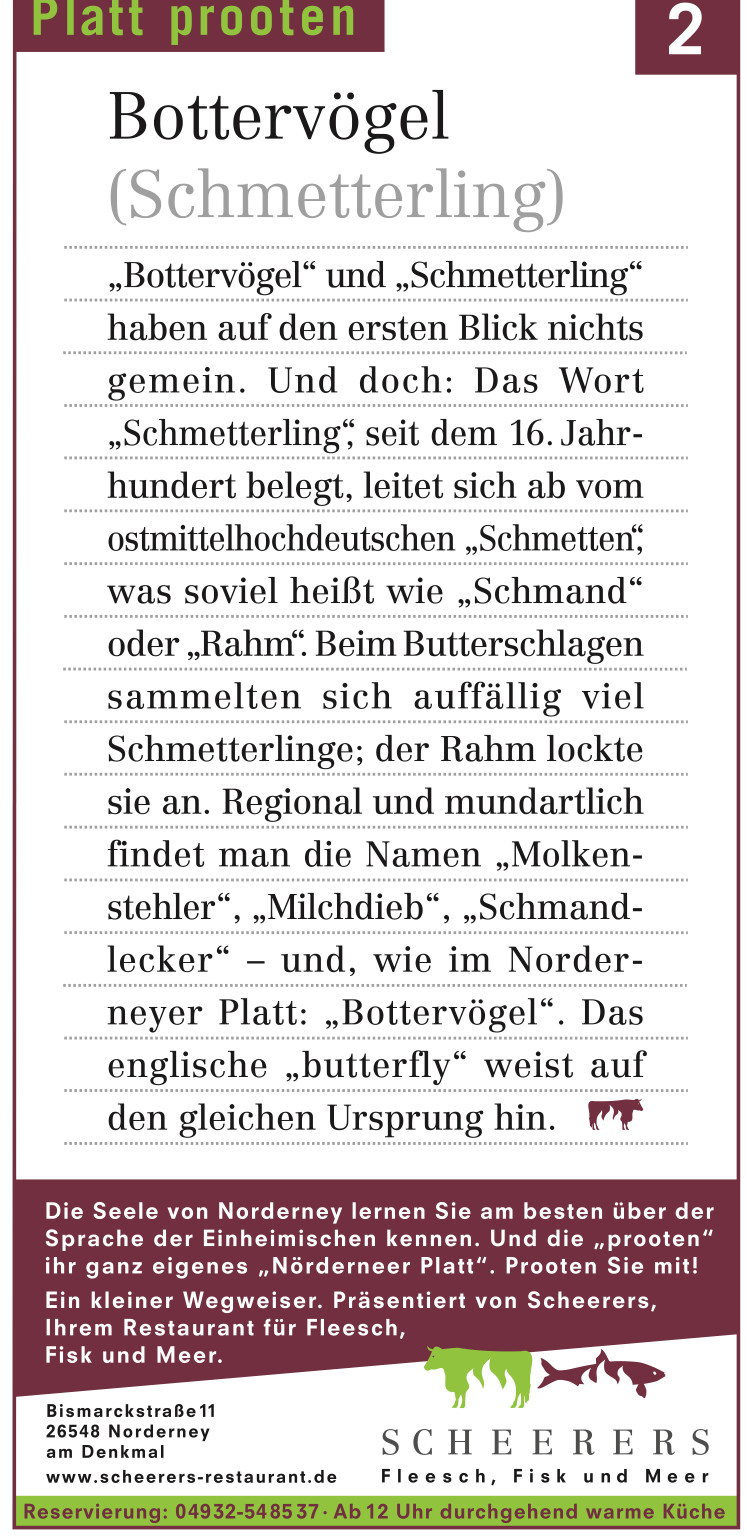According to various sources (1, 2, 3) the insect butterfly, German Schmetterling, is regionally called Buttervogel. Although I was able to find a plethora of sources claiming the existence of this regional term, no source I found did name the region within the German Sprachraum in which this term is used. I would prefer an academic source on the geographical spread of the term Buttervogel for Schmetterling, but if you know the expression, you can already help me by answering in which part of the German Sprachraum you learned it.
-
4I have never heard the term Buttervogel. Your sources at the links read suspiciously similar like copied from each other. According to some etymological dictionary (Paul), this is apparently a northern German notion.– tofroCommented Dec 23, 2017 at 10:27
-
3Buttervogel ist mir in Niedersachsen auch nicht geläufig. Es sieht so aus, dass deine Quellen alle bei Wikipedia abgeschrieben haben.– DevonCommented Dec 23, 2017 at 10:29
-
1I never heard this term, neither in Austria nor Bavaria.– HulkCommented Dec 23, 2017 at 14:58
-
1In English: Butterfly. <g>– Rudy VelthuisCommented Dec 25, 2017 at 23:42
5 Answers
Summary
I find evidence for use of the term Bottervögel in East Frisian Low German and less certainly in the Low German of Braunschweig, Buxtehude and Solling in Lower Saxony (Niedersachsen). Geography enthusiasts please confirm which of these don’t belong to East Frisia! I furthermore find some indications for the Form Bottervagel in the Low German of Bremen-Oldenburg and Mecklenburg.
On the variant Bottervögel and its localisation
I scanned a few dictionaries of Low German without initial success. Then I had the idea to perform a reverse search. And behold! This dictionary of East Frisian contains Bottervögel, Pl. Bottervögels!
This site offers an interesting etymological hypothesis:
As Norderney is one of the East Frisian Isles, we have almost certainly confirmed the word is used there. Even more conformation comes from this short list of East Frisian words, which contains the term! The Author of this work wrote in Braunschweig, which like Nordeney is part of Lower Saxony (but not Frisia, thanks to Jan for the confirmation!). This work about Buxtehude in Lower Saxony mentions the term. The Author of the poetry featured here used the term. She hailed from Solling in Lower Saxony.
For an indication that the term is still alive within the Lower German community, see this poetry from 2009! On the same note, see this Wipperau-Kurier from 2011. The newspaper seems to be based in Uelzen in the Hamburg metropolitan region.
For some 18th century uses of the term in zoological books that otherwise use High German see here, here and here — the last work seems to be ornithological, which makes me almost certain that Bottervögel means something entirely different here! Another work in Hochdeutsch from 2016, where Bottervögel could mean something different is this one.
On the variant Bottervagel and its localisation
I first couldn’t find it in this dictionary of Low German »für Schleswig-Holstein, Hamburg, Bremen und Teilbereiche von Mecklenburg-Vorpommern und Niedersachsen«, which contains nearly 20 terms for butterfly, but now found Bottervagel, Pl. Bottervagels! This last variant was used by Heide Tietjen in her translation of »Butterflies are free«, thus rendered »Bottervagels sünd free«. Tietjen herself does not elaborate on this particular play, but informs to mainly have translated works into “das hier gebräuchliche bremisch-oldenburgische Plattdeutsch”. Thus I tentatively assume this form to be Low German from the Bremen-Oldenburg Region (possibly among other regions). The form Bottervagels has its own Wikipedia site in Plattdütsch (Lower German). It lists the synonyms: Bottervagels; Bottervogels; Botterlickers.
Furthermore the title of »De meckelnbörgschen Montecchi un Capuletti« leaves no doubt that it aims to reproduce the idiom of Mecklenburg. In so far as it is successful, we can conclude that Bottervagel -contained therein - occurs in the Low German of Mecklenburg!
On the etymology of similar terms
Grimm under Schmetterling writes at length about this. I only quote a small part:
eine gruppe von namen, die besonders im nd. und md. gebiete heimisch sind, setzt das thier mit butter, milch, molke in beziehung: buttervogel, butterfliege (vgl. ags. buttorfleóge, engl. butterfly), schmantlecker (oben sp. 936), botterlicker, molketewer (nd. korrespondenzbl. a. a. o.), molkentöfer (Adelung unter schmetterling), molketêwer (Frischbier 2, 70a, hochd. molkenzeber, -zöber, daneben molkenschubber), mulkentöwer (brem. wb. 3, 144), molkendew (Dähnert 311b), molkentoiwer (Frommanns zeitschr. 4, 268, 5), schles. molkendieb. entstellungen sind molkenstäuber, molkendieb. der ursprüngliche sinn dieses molkentöver ist 'molkenzauberer' (zu mnd. toverer, tover, zauberer Schiller - Lübben 4, 599b), später wurde der zweite bestandtheil des wortes umgedeutet und ein 'molkendieb' daraus. eine alte vorstellung des volksglaubens liegt hier zu grunde, dasz hexen die gestalt von schmetterlingen annehmen und in dieser verhüllung einem ihrer hauptgeschäfte, dem verderben der milch- und buttervorräte nachgehen.
-
1Braunschweig is about as far away from Frisia as you can get without leaving Lower Saxony. (Only Göttingen would be even further away.)– JanCommented Dec 23, 2017 at 16:39
-
I'd guess the fact you had to search so hard for a mention says something about the commonality of this word. +1 anyway, even if you forgot to mention this conclusion.– tofroCommented Dec 24, 2017 at 12:45
-
1@tofro We could say so, but I am not sure if spoken and written/google frequency are not rather decoupled for Low German. Therefore I removed my initial conjecture of rarity. Besides the poetry, I found some more dialect fiction that includes it. But in the end I have trouble deciding how many occurrences make a dialect term well known. At least it doesn’t seem to fall into oblivion.– LudiCommented Dec 25, 2017 at 12:44
When searching the DWDS for Schmetterling we can find a quite interesting entry in the Etymologisches Wörterbuch nach Pfeifer on the etymology:
Der wohl aus Schmettenling dissimilierte Name ist offensichtlich zu südostd. omd. Schmetten m. ‘Sahne, Rahm’ (s. ↗Sahne) gebildet, einer Entlehnung (17. Jh.) aus gleichbed. tschech. smetana, und beruht auf dem Volksglauben, daß Hexen in Schmetterlingsgestalt fliegen, um Milch und Rahm zu stehlen; vgl. andere landschaftliche Bezeichnungen wie Buttervogel, Milch-, Molkendieb, -stehler sowie engl. butterfly.
According to this both Schmetter and Butter come from butterflies' preference for butter. So the etymology of Schmetterling Buttervogel, and butterfly are closer than on first sight.
The usage of Buttervogel appeared to be Low German only.
On Schmetterling and Buttervogel Johann August Eberhard 1828 wrote 1828 in his Versuch einer allgemeinen deutschen Synonymik:
Buttervogel ist meist nur in Niederteutschland gebräuchlich und beziehet sich [...] darauf, daß dieses Thier nach Butter, Sahne, Milch, lüstern ist, weswegen es auch an vielen Orten Milchdieb, Molkendieb genannt wird, [...]. Schmetterling läßt Adelung von Schmettern herkommen, in sofern dieses ein Verstärkungs- oder Anhäufungswort von Schmeißen ist.
There he points to Low German usage and the relationship to butter but he still quotes Adelung who believed that Schmetter- came from Schmettern in th meaning of throwing.
-
I have a worked for quite a time on my uncle's diary farm (at times when there were butterflies still existing), but there was never a butterfly seen around the milk cans or whereever. Butterflies like flowers, not milk. I believe the explanation of butterflies/ Schmetterlinge being called because of them appearing around diary activities or butter making is crap. Commented Dec 23, 2017 at 21:47
-
1@ChristianGeiselmann yes it is, but it is possible that people of yore believed it. Such bogus exists. Most Greeks in the region of Volos still believe that Geckos go to the milk, fall into it and turn it into deadly poison.– LudiCommented Dec 25, 2017 at 13:13
In a book from 1828 "Attempt of a general German synonym in a critically philosophical dictionary of meaningful related words ..." you'll find a hint for the region Niederdeutschland means northern part of Germany or Lower Saxony. See German title link: Versuch einer allgemeinen deutschen Synonymik in einem kritisch philosophischem Wörterbuch der sinnverwandten Wörter ...
See also: DWB Grimm: Schmetterling
eine alte vorstellung des volksglaubens liegt hier zu grunde, dasz hexen die gestalt von schmetterlingen annehmen und in dieser verhüllung einem ihrer hauptgeschäfte, dem verderben der milch- und buttervorräte nachgehen.
An old notion of popular belief underlies the idea that witches take the form of butterflies and in this disguise they pursue their main business, the spoilage of milk and butter supplies.
I think it was or is still in use in the north western part of Germany, i.e. Niedersachsen. I first noticed the usage of this word reading Hermann Löns (1866-1914), for instance here or here. I got the impression that he used the word as an archaism (if one take account of the fact that the 1910 written "Wehrwolf" is situated in the 17th century).
Auf Platt gibt es Botterflögel für Libelle, was auf Hochdeutsch 'Butterflügel' wäre.


